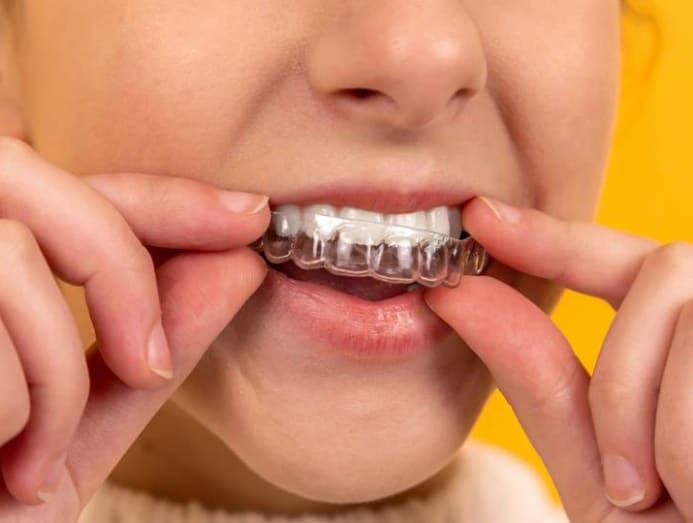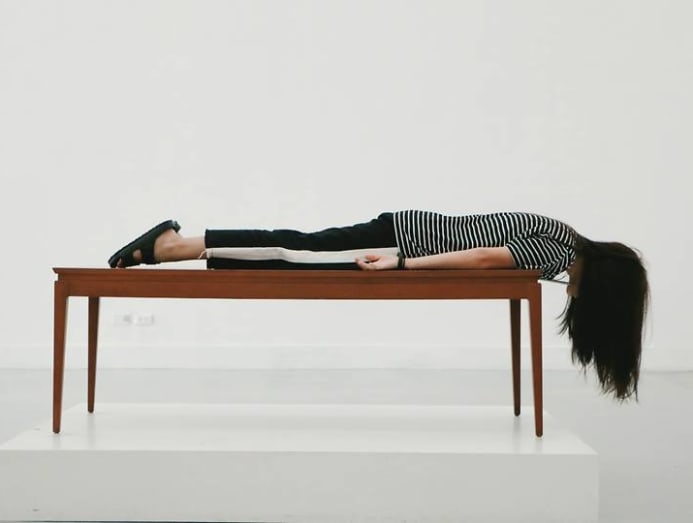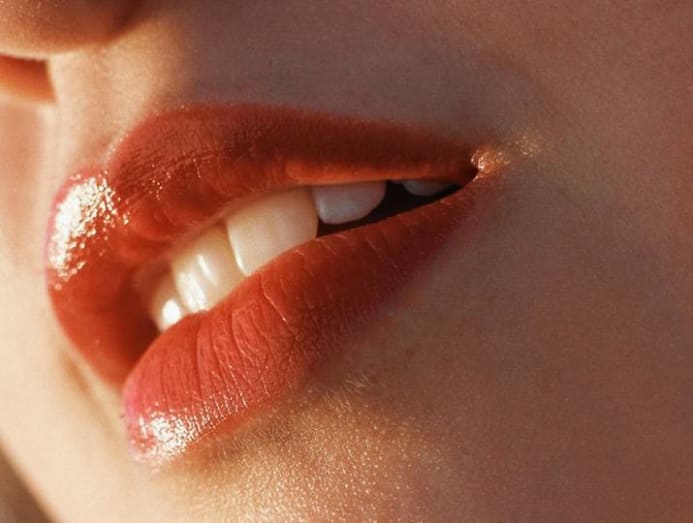Do you grind your teeth? That night guard may not be the right fix
Everyday stressors similar a study due at piece of work, the fridge breaking and the domestic dog throwing up can sometimes make you desire to grit your teeth.
Simply layer on acme of that a pandemic, economic incertitude and political upheaval, and you might beginning to give your jaw a serious workout – gritting and grinding with as much as 250 pounds (113kg) of force.
Dentists have reported an increment in patients with molar fractures since the get-go of the pandemic, which they attribute to bruxism, the technical term for gritting, grinding or clenching your teeth.
Thought to be precipitated or exacerbated past stress and feet, bruxism is largely subconscious and often occurs during slumber. Most people don't know they grind their teeth unless a dentist tells them so, based on tooth wearable. Less obvious indicators include itchy or plugged ears, neck hurting and even premature ageing of the face.
Expensive acrylic or condom oral fissure or bite guards – frequently chosen dark guards – are typically prescribed every bit a rubber.

While nighttime guards may assist to foreclose some dental wear and tear, some studies advise they can be ineffective or fifty-fifty make the trouble worse.
This has led some experts in the fields of dentistry, neuroscience, psychology and orthopedics to say there needs to be a paradigm shift in our understanding of the causes and treatment of bruxism. They say information technology is a behaviour, like yawning, belching or sneezing, rather than a disorder.
"It's not abnormal to brux," said Frank Lobbezoo, a bruxism researcher and professor and chair of the Academic Centre for Dentistry Amsterdam in kingdom of the netherlands. "In fact, it can be adept for you."
READ: Why you lot should draw the line between personal life and work life to exist happy
Sleep studies indicate that the majority of people have three or more bursts of activity in the jaw'southward masseter muscle (your major chewing musculus) during the night. It likewise happens during not-REM sleep. So, opposite to popular belief, you're non doing it while you are dreaming.
Moreover, the evidence suggests that this muscular activity tin have the salubrious outcome of opening upwards your airway to allow in more oxygen.
Clenching and grinding also stimulate salivary glands to lubricate a dry rima oris and neutralise gastric acid. Every bit a result, experts say it tin be dangerous to article of clothing a nighttime guard or splint if you accept sleep apnoea or severe gastrointestinal reflux disorder (GERD).
"There's tremendous over-treatment for a non-problem," said Karen Raphael, psychologist and professor at New York Academy College of Dentistry, referring to the widespread use of seize with teeth guards, tranquilisers and even Botox injections to foreclose bruxism.
"There is no show that tooth vesture patterns reflect current grinding." Indeed, she said, tooth wear is more ofttimes associated with an acidic diet, which both erodes enamel and triggers bruxism to increase the pH in the oral fissure.
Treating bruxism in this example would be treating the outcome rather than the crusade.
READ: Working from dwelling has its perks. Here's how to put the advantages to best use
Of form, an overproduction of tummy acrid and reflux often occur during times of stress, which might in part explain why dentists and patients are reporting more cracked teeth and jaw pain since the kickoff of the pandemic.
Also, people tend to drink more than alcohol when they are anxious. Fifty-fifty balmy intoxication leads to more flaccid neck muscles, which tin crusade an increase in both the duration and force of bruxism to restore airflow.

Other factors that may increase bruxism are poor sleep hygiene and bad posture. If yous are a lite or poor sleeper, yous spend more time in non-REM sleep, which is when people naturally brux.
This might be caused by stress, but besides consuming caffeine or sleeping with your telephone.
And we tend to take our postural habits to bed with usa. If y'all're tight and clenched when you are awake, you lot're likely also tight and clenched when you are asleep, or at least it takes yous longer to unwind.
This is especially true at present as people spend and then much time hunched over their devices with caput, neck and dorsum forming a taut and orthopedically ill-advised "C".
And so the question is non so much whether y'all brux, only why y'all might exist bruxing more is normal and mayhap causing jaw or dental problems.
"Bruxism is not a affliction," said Giles Lavigne, a neuroscientist, dentist and professor at the University of Montreal. "It's just a behaviour, and like any behaviour, when it reaches a level that it'southward bothersome you may need to consult someone."
Perhaps a physical therapist who can teach yous how to relax your jaw and do abdominal breathing. And maybe a psychologist can assistance yous change behaviours that lead to an increase in bruxism, like eating too much before bed and drinking more than than your share of vino and whiskey.
READ: Feeling lazy to get upwards? Why working from bed might actually be great for you
Simply elementary sensation of the position of your mouth, tongue and teeth throughout the day may get a long way toward preventing tooth-grinding.
"Nobody knows where their tongue is when they are at rest," said Cheryl Cocca, a physical therapist at Expert Shepherd Penn Partners in Lansdale, Pa, who treats patients with bruxism.
She recommends continually checking to brand sure you are breathing through your nose with your mouth closed, your tongue resting on the roof of your mouth, and your teeth autonomously.
Set a timer if you need to remind yourself or do it every time you stop at a red lite or get a text alert.
Part of the problem could be our modern diet. A growing torso of prove supports the once-fringe notion that, following the agricultural and industrial revolutions, equally humans began eating foods that are more than processed and easier to chew, we came to have smaller jaws than our ancestors and underdeveloped orofacial muscles.
A result, researchers say, is that we tend to exhale through our mouths, with our tongues resting on the bottom of our mouths.

"Watch people on subway, sentry people on the passenger vehicle, they're all on their phones, their mouths are slightly open breathing in and out.
Particularly kids, they all are," said Dr Tammy Chen, a prosthodontist in New York Urban center, who has written about the increase in molar fractures.
"As soon as the mouth is open, the tongue is down. The tongue should e'er be on summit of the rima oris pushing upward and out," which strengthens face and cervix muscles, widens the jaw and opens the airway.
At night, our modern penchant for soft pillows and mattresses, rather than lying on the footing every bit our ancestors did, makes our mouths more likely to autumn open and for usa to drool, leading to a drier, more acidic oral cavity microbiome, not to mention sagging cervix muscles, which further obstruct the airway.
A firm pillow, or a folded blanket under the caput, tin help, equally tin committing to an orofacial, neck and airway stretching and strengthening routine.
Cocca recommends daily repetitions of pulling your head back into your neck as if y'all were trying to retreat from someone leaning in for a osculation and besides nodding your caput down until your mentum touches the base of your throat.
Other practiced exercises are squeezing your shoulder blades together and holding, as well equally putting your arms upwards like a goal mail service and leaning into a doorway to stretch out your breast.
Research also indicates diaphragmatic breathing and singing can strengthen and expand your airway muscles to reduce both snoring and bruxism.
While bite guards worn during the day or night won't stop you from grinding, Dr Chen said, they can deed every bit a bumper to protect teeth.
Just only if they are carefully designed according to the size and shape of your mouth, and of materials specific to whether yous are a grinder, clencher or chomper.
Hard acrylic guards are thought to exist meliorate for grinders and chompers, while softer rubber guards are better for clenchers. Nevertheless, experts caution guards tin can sometimes brand the problem worse, particularly if they are poorly fabricated.
"Bruxism frequently comes down to a breathing or airway issue," Dr Chen said. "Nighttime guards are a band aid, but if you desire to end grinding, you have to go to the root cause of the event."
Past Kate Murphy © The New York Times
This commodity originally appeared in The New York Times.
Source: https://cnalifestyle.channelnewsasia.com/wellness/grind-your-teeth-your-night-guard-may-not-be-the-right-fix-182596
Post a Comment for "Do you grind your teeth? That night guard may not be the right fix"